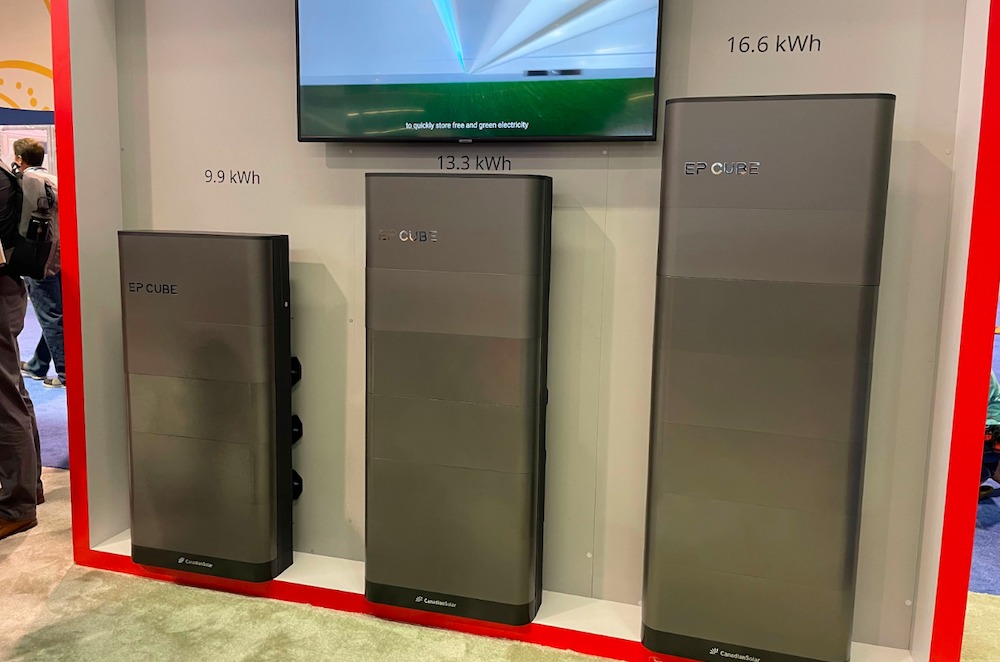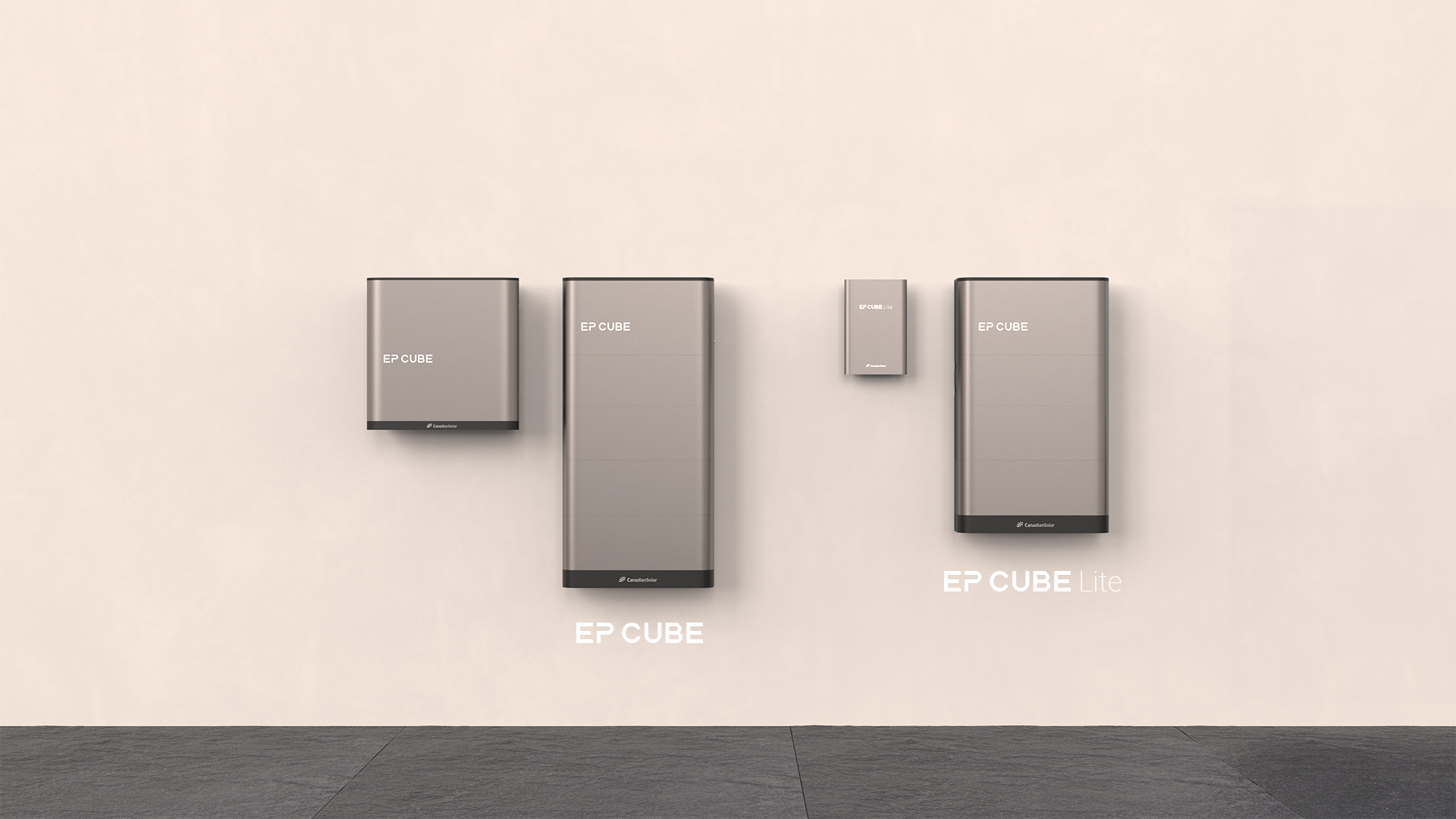
Find out what solar batteries cost in your area
Canadian Solar has been a trusted name in solar panels for over two decades. They even landed the number one spot on our best solar panel brands list of 2025.
The brand’s energy storage offering, the EP Cube, is just as impressive, coming in at number four in our best solar batteries of 2025 ranking. The EP Cube energy storage system can store up to 19.9 kilowatt-hours of energy, comes with an integrated inverter, and can be installed with or without solar.
Let’s take a closer look at everything Canadian Solar’s EP Cube has to offer.
Key takeaways
-
The EP Cube has a built-in inverter and is modular, meaning homeowners can choose how much storage capacity they need up to 19.9 kWh.
-
Our solar experts estimate the EP Cube battery costs $14,200 before incentives, just below the industry average cost.
-
Canadian Solar offers the EP Cube Lite, which comes at a lower price point and does not have backup capabilities but is designed to maximize energy savings in areas with time of use rates.
-
The EP Cube has an excellent battery warranty, with 80% capacity retention after 10 years or 6,000 cycles, whichever comes first.
-
The EP Cube has solid operating features, a great warranty, and is being offered by a trusted company.
Canadian Solar EP Cube specs and features

Image source: Canadian Solar EP Cube
Spec | EP Cube | EP Cube Lite |
|---|---|---|
Total energy capacity | 9.9 - 19.9 kWh | 6.6 kWh - 19.9 kWh |
AC output (solar + battery) | 7.6 kW | 7.6 kW |
AC output (battery only) | 5 - 7.6 kW | 3 - 7.6 kW |
Weight | 286.6 - 485 lbs | 220.5 lbs - 485 lbs |
Dimensions | 23.62'' x 48.03'' x 9.25'' - 23.62'' x 73.43'' x 9.25'' | 23.62'' x 39.57'' x 9.25'' - 23.62'' x 73.43'' x 9.25'' |
Warranty | >80% capacity up to 10 years or 6,000 cycles | >80% capacity up to 10 years or 6,000 cycles |
Canadian Solar has two versions of its battery system: the EP Cube and the EP Cube light. Both are modular batteries with built-in hybrid inverters that allow for easy integration with new and existing solar systems.
The main differences between the EP Cube and the EP Cube Lite are that the EP Cube Lite has a smaller starting size of 6.6 kWh, a more compact gateway system called the ComLite, and it doesn’t have backup power capabilities. The EP Cube Lite can be upgraded to an EP Cube system in the future.
Because the EP Cube Lite is smaller, it has less wiring and requires a smaller installation crew, meaning it costs less. Canadian Solar claims it can be installed in 20 minutes or less.
Based on these specifications, it seems like the EP Cube is a pretty solid battery, outperforming some current batteries on the market while offering greater customization. We got to see the EP Cube in person at the RE+ conference – and believe us, it’s a great-looking battery. We wouldn’t mind having it in our garage!
Expert insight! The EP Cube Lite was designed with California’s Net Billing policy in mind. Although it can’t provide backup power, it can help combat time of use pricing and low solar buyback rates, saving homeowners more money. If having access to energy during a power outage is your main concern, opt for the EP Cube instead.
How much does the EP Cube cost?
Mode | Equipment cost* | Est. Installation labor costs | Est. total installed cost |
|---|---|---|---|
EP Cube | $11,200 | $3,000 | $14,200 |
*Based on 16.6 kWh EP Cube system
Our experts estimate that a 16.6 kWh Canadian Solar EP Cube solar battery installation would cost about $14,200, including installation costs.
The total cost of installing a Canadian Solar battery will vary depending on the size and installer you choose. This falls on the lower side of the average price of a solar battery and is much cheaper than options like the Enphase IQ battery and Panasonic EVERVOLT. It is similar to the price of the Tesla Powerwall.
Still, $14,000 isn’t pocket change. Luckily, there are various solar battery incentives available across the country. Battery storage qualifies for the 30% federal solar tax credit, even if the battery isn’t connected to solar panels!
Canadian Solar EP Cube vs. competitors
Battery | Energy storage capacity | Max Continuous Output | Includes solar inverter? | Warranty | Est. cost per kWh of storage (before installation) |
|---|---|---|---|---|---|
EP Cube (5 battery modules) | 16.6 kWh | 7.6 kW | Yes | 10 years | $690 |
Enphase IQ 5P (3 battery modules) | 15 kWh | 11.52 kW | No | 15 years | $810 |
FranklinWH Battery | 13.6 kWh | 5 kW | No | 12 years | $1,050 |
Tesla Powerwall 3 | 13.5 kWh | 11.5 kW | Yes | 10 years | $680 |
Panasonic EverVolt (3 battery modules) | 13.5 kWh | 7.6 kW | Yes | 12 years | $910 |
The Canadian Solar EP Cube stacks up well against other popular batteries on the market, with solid performance specs and a great price point.
The EP Cube’s modular design is a huge draw, as you can customize the size based on your energy needs. The 6.6 kWh capacity EP Cube Lite is great for homeowners who just want to avoid time-of-use rates, while the 19.9 kWh EP Cube can keep key appliances running throughout a prolonged power outage.
Other batteries, like the Panasonic Evervolt and Enphase IQ 5P, also let you customize the amount of storage you install, but they have much higher price points than the EP Cube.
Its average power output is 7.6 kW, which is enough for most homeowners. Depending on how many battery modules you have, the output may be slightly lower when the battery is operating off-grid without solar panels. If you need something more powerful to run your electric loads, you can expand the EP Cube system or opt for something like the Tesla Powerwall 3.
It’s also worth noting that the EP Cube has a NEMA 4X enclosure rating, so it can be installed outdoors and can withstand weather conditions, dust, corrosion, and water. Plus, the EP Cube is a lithium iron phosphate battery, which means the battery is safer and will last longer than other types of lithium-ion batteries. It can also be integrated with a gas-powered generator for an added layer of backup protection.
The EP Cube warranty
Canadian Solar is offering an excellent warranty for its battery system. The warranty states the battery will hold at least 80% of its capacity at 10 years, or 6,000 cycles, whichever comes first.
Most batteries on the market today only offer a 70% capacity guarantee after 10 years, meaning the EP Cube can store more power for you than its competitors over time. Not to mention, you’ll likely reach the full 10-year warranty before completely charging and discharging the battery 6,000 times.
We also trust Canadian Solar to be around to honor any future warranty claims, thanks to the company’s strong financial performance.
Is Canadian Solar’s EP Cube battery right for you?
Canadian Solar’s flagship residential battery is a pretty impressive product.
The modularity of the battery really sets it apart from a lot of the popular batteries available today, like sonnen and Tesla, and it gives homeowners more control over how much energy storage they install. The best part is the warranty - it exceeds industry standards, and Canadian Solar is a reliable brand you can trust to fulfill it if needed.
Keep in mind that only some people need a solar battery. For most homeowners, a battery won’t save you any additional money on your electric bills, but it will provide peace of mind in case you experience a power outage. You can use our solar battery calculator to get an idea of how installing energy storage will impact your investment in solar panels, so you can find out if it’s worth it for you.
Catherine is a solar industry analyst and content manager with five years of experience researching and reporting on residential solar. As the former Written Content Manager at SolarReviews, she led a team producing informative content to help homeowners make informed decisions about solar investments. Her expertise has been featured in Solar Today Magazine and Solar Industry Magazine, with insights cited by major outlets including Forbes and Bl...
Learn more about Catherine Lane